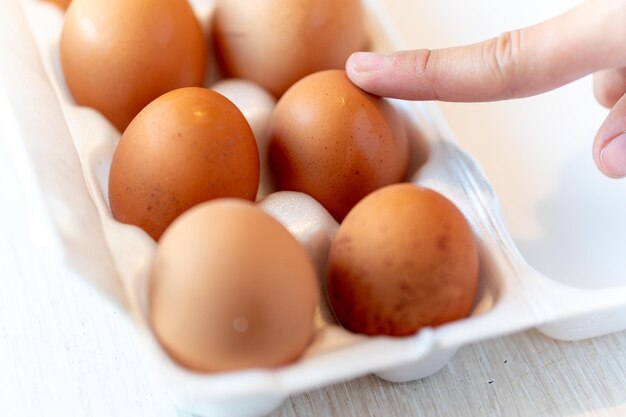How Long Will Your Boiled Eggs Last in the Fridge? Discover the Ins and Outs of Boiled Egg Storage
Boiled eggs are a versatile, nutritious snack enjoyed by many. Whether layered into a salad or devoured on their own with a sprinkle of salt, they’re both delicious and convenient. But once hard-boiled, how long is it before they outstay their welcome in your refrigerator? This guide will delve into key aspects of storing boiled eggs, ensuring you maximize freshness and safety. Let's crack open the facts on how long boiled eggs can chill in your fridge!
🍳 Understanding the Shelf Life of Boiled Eggs
When boiled, eggs undergo several changes that extend their shelf life compared to raw eggs. Here's what you need to know:
- Boiling as a Preservative: Cooking an egg may kill bacteria present on or around it, thereby extending its shelf life.
- Refrigeration is Key: To maximize shelf life, boiled eggs should be refrigerated within two hours of cooking.
How Long Do Boiled Eggs Last?
In the Refrigerator: Properly stored, boiled eggs can last for about one week in the fridge. Use an airtight container to prevent them from absorbing fridge odors and flavors, which eggs are notorious for doing.
On the Counter: Outside of refrigeration, boiled eggs should be consumed on the same day they are cooked. High ambient temperatures accelerate spoilage and increase the risk of contamination.
🥚 The Science Behind Egg Preservation
Eggs possess a natural barrier, the eggshell, which along with its coating, shields it from bacteria. However, boiling strips off this protective layer, leaving the egg inside vulnerable over time. Here's how to ensure extended freshness for your boiled eggs:
- Peeling Doesn’t Always Help: Although peeling boiled eggs can save fridge space, it may reduce their shelf life. The shell provides some protection, maintaining freshness longer.
- Consider Vinegar or Salt Additions: Some consumers add vinegar or salt to the boiling water. This isn’t conclusive evidence of extending shelf life, but they may help solidify egg whites faster, creating a more compact egg.
🌡️ Proper Refrigeration Techniques
Storing in the Fridge
- Cool the Eggs Rapidly: After boiling, let eggs sit in cold water to quickly bring down their temperature. This reduces microbial growth potential and makes peeling easier if you choose to peel first.
- Airtight Storage: Place eggs in a sealed container or resealable bag. This prevents exposure to air and absorbs odors.
- Label the Eggs: Clearly label and date the container. This helps track how long the eggs have been refrigerated.
Placement Matters
Where you store your eggs in the fridge is crucial. The door is the warmest spot, due to frequent opening and closing. Instead, store eggs on a shelf towards the rear where it's consistently cold.
🚦 Recognizing Signs of Spoilage
Your sense of smell and sight are reliable tools for identifying spoilt eggs. Here are some signs to watch out for:
- Odor: A sulfuric, rotten egg smell is a clear indication the egg has gone bad.
- Texture Changes: Discoloration or unusual sliminess suggests spoilage.
- Mold: Visible mold growth indicates that the egg should be discarded.
🥗 Versatility of Boiled Eggs
While boiled eggs themselves are a convenient snack, they also serve as a fantastic ingredient. Here are a few suggestions for utilizing boiled eggs creatively in your meals:
- Salads: Dice boiled eggs for a protein boost in salads.
- Sandwiches & Wraps: Make an egg salad or add sliced eggs to your sandwiches for extra flavor and protein.
- Breakfast Bowls: Top oatmeal or grain bowls with a halved boiled egg for added texture and richness.
🗒️ Quick Reference Summary for Boiled Egg Storage
To ensure your eggs stay fresh and ready for use, follow these simple tips:
- 🐣 One-Week Rule: Boiled eggs are best consumed within one week if stored properly.
- 🔒 Airtight Solutions: Use sealed containers to prevent smells and prolong freshness.
- 🌡️ Rapid Cooling: Cool them quickly in ice water post-boiling to stop further cooking.
- 👃 Trust Your Senses: Always inspect eggs for any signs of ruin before consumption.
These easy-to-follow steps will help ensure you’re always enjoying your boiled eggs at their freshest.
Boiled Eggs: Beyond Just Storage
Boiling is but one way to enjoy eggs, but understanding its nuances can transform your meal prep experience. By knowing when and how to store boiled eggs, you can make the most of their dietary benefits without worry.
Final Thoughts: The Egg-citing World of Food Storage
Mastering the art of storing boiled eggs means more than just extending their shelf life. It’s about safety, enjoying their freshest states, and avoiding waste. With this guide in your arsenal, you're well-equipped to handle your boiled eggs with confidence, ensuring you get the maximal benefit from this versatile kitchen staple. Whether you're a fan of the humble egg or an avid meal prep enthusiast, these insights will guide you on a path to efficient and cost-effective food storage practices.

